 Terrestrial radio may be in a crisis. MP3 technology has saturated our lives, and Satellite radio has begun its quest to do to terrestrial stations what cable has threatened to network TV. Ironically, the future of terrestrial radio may lie in its past. What could save radio as a viable medium is for it to give to its audience what they can’t get anywhere else: #1 hit music that is likely not to be on your MP3 player, and the stories and interviews to go with it. That future may be in programs like Barry Scott’s The Lost 45s.
Terrestrial radio may be in a crisis. MP3 technology has saturated our lives, and Satellite radio has begun its quest to do to terrestrial stations what cable has threatened to network TV. Ironically, the future of terrestrial radio may lie in its past. What could save radio as a viable medium is for it to give to its audience what they can’t get anywhere else: #1 hit music that is likely not to be on your MP3 player, and the stories and interviews to go with it. That future may be in programs like Barry Scott’s The Lost 45s.
HISTORY OF THE LOST 45s
***
If you happened to have been surfing the radio dial on any Sunday night since 1981, you’d be likely to come across exactly one station playing ABBA, KC & The Sunshine Band, or Captain & Tennille. Although the location on the dial has changed many times, the distinctive and slightly raspy voice has not. Barry Scott’s unconventional radio persona has been a staple on the Boston airwaves since 1981, when he first launched his radio career as a freshman at Emerson College with a one-hour show called The Gold Rush. You had to offer something different to get on Emerson College radio in those days, and no one was playing ‘70s music in the early ‘80s. The most popular part of the show was a 15-minute closing segment called the Lost 45s, when Scott would play then-unheard power pop from the early to mid ‘70s, like The Partridge Family and the Bay City Rollers.
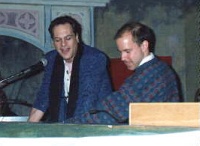
Scott was hired out of college in 1985 as the Promotions & Marketing Director at WZLX, and was given a one-hour time slot from 11pm to midnight on Sunday nights for his show. He tried to take the name The Gold Rush with him, but Emerson said they owned the rights to the name. Scott instead decided to name his new show The Lost 45s. “They actually did me a favor,” Scott recalls, “It’s a much better name.”
The station received such a great response about the show in the first few weeks that ZLX offered to expand the show to 7pm to midnight. “It’s actually been the requirement now when I move,” says Scott, offering that this may be part of the show’s continued success through all the moves. “When people develop a habit, they tend to stick with the habit.” The strategy worked, and Scott has managed to keep his show on the air for decade upon decade, consistently achieving the number one rating in its Sunday night time slot.
In 1992 Scott was let go from WZLX, and within a week was at WBOS. But that too was only for a time. “I always run into problems with this show, it’s just so different, and there’s no room for different in radio,” says Scott. Once again Scott found a new home for the show within a week, this time at MIX 98.5, where he met Vice President of Programming Greg Strassell. “I’m fortunate that I have an enlightened program guy,” says Scott. Strassell has helped to make sure that The Lost 45s has consistently had a home in the years since, and the two have worked together at both 93.7 and at Oldies 103.3. At each station the show has immediately climbed to number one in its time slot. With the demise of Oldies 103.3, Scott took the show to WPLM am/FM and WXEX AM/FM, so he could blanket the East Coast from Providence to Portland.
THE ROTATION
***
So how does Scott decide what to play and what to leave lost? “I don’t decide,” says Scott. “The listeners decide.” The show is all-request, but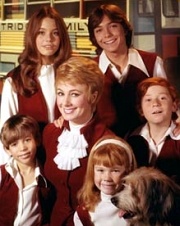 Scott admits he has pushed his favorites until the audience begins to request them. He defines a “Lost 45” as a Top 40 song “that doesn’t get airplay regularly on any other station in town.” Tracks could be from as early as 1965 and as late as 1984, as long as the song is not “too techno.” As a result, the catalogue from which the show’s songs are drawn is enormous. There are over 300 songs a year that hit the Top Forty, and the show covers almost twenty years of music. That means that on any given Sunday, a listener could hear one of over 7000 songs.
Scott admits he has pushed his favorites until the audience begins to request them. He defines a “Lost 45” as a Top 40 song “that doesn’t get airplay regularly on any other station in town.” Tracks could be from as early as 1965 and as late as 1984, as long as the song is not “too techno.” As a result, the catalogue from which the show’s songs are drawn is enormous. There are over 300 songs a year that hit the Top Forty, and the show covers almost twenty years of music. That means that on any given Sunday, a listener could hear one of over 7000 songs.
The most requested style is what Scott calls early “power pop,” songs from Tony Orlando & Dawn, the Osmonds or Rick Springfield. But besides this foundation, the show continues to be inspired by a broad range of influences. “On radio in the seventies, you could go from Barry Manilow to Kiss to a disco song, to Parliament Funkadelic, to John Denver. And that’s what I do, because that’s the way it used to be.”
THE COLLECTION
***
With between seven and eight thousand songs in the playlist, the Lost 45s boasts the nation’s largest on-air music collection. The collection itself is owned by Scott personally, and the CDs and vinyl records from which the collection is drawn take up an entire room in his home. “It’s been a passion for years,” says Scott. He first started buying vinyl albums as a kid, and his collection soon grew to impressive proportions.
In the ‘80s when CDs first appeared, Scott realized that he was going to have to repurchase all of the music he had previously bought on vinyl, a process which is now nearly complete. There are about 200 songs left in his collection that aren’t on CD, and 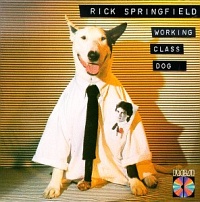 almost all of these are because these songs simply can’t be found on CD. “There’s a reason why most of these songs that are left aren’t on CD anymore,” Scott explains. Many of these songs have not been released digitally due to legal or copyright disputes, ownership disputes, or in some cases they owners themselves have chosen to block their re-release.
almost all of these are because these songs simply can’t be found on CD. “There’s a reason why most of these songs that are left aren’t on CD anymore,” Scott explains. Many of these songs have not been released digitally due to legal or copyright disputes, ownership disputes, or in some cases they owners themselves have chosen to block their re-release.
Scott says he can’t begin to estimate how much money he may have spent on his collection over the years, but he is pretty sure he isn’t missing anything that hit the Top 40 from during the years the show covers. As a student at Emerson, Scott would hit the used record stores in Boston and Cambridge and buy every rare pop album he could find, but those days are gone. These days, he finds most of his music through Amazon, EBay or Google.
But now a new quest has begun, which is getting all of The Lost 45s library backed up to hard drives, in a common uncompressed file format called WAV. Most songs have also been converted to the popular MP3 format as well. For the show, Scott usually brings in his CDs. “Eventually the vinyl will get stored,” Scott says, “but I’ll never throw them away.”
THE INTERVIEWS
***
But the Lost 45s is more than just a series of once-forgotten and great songs. Much of what keeps fans coming back to the show are the facts and stories around those songs,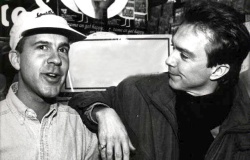 which Scott pulls together from research and from interviews with the artists themselves.
which Scott pulls together from research and from interviews with the artists themselves.
Scott has interviewed over 1,000 people, even releasing a book about the first sixty. To make the interviews interesting for both himself and the listeners, he rarely takes a conventional approach. “I try not to ask the same questions as everybody else,” says Scott. “When I interviewed Carly Simon, I said, I’m not going to ask you that question everybody asks about ‘You’re So Vain,” but I do want to know what it was like singing with James. Normally she doesn’t talk about James Taylor, but she told me all about it. Sometimes it’s just the way you phrase it.”
The most fun interviews are with the artists who speak their minds. “Cher was fun, Olivia Newton John was fun,” Scott recalls. “But Debbie Harry of Blondie was real fun. She just said whatever was on her mind. If she hated a question, she’d tell me to fuck off. It was great.”
To prepare for interviews, and to fill the show with the facts and stories for fans, Scott turns to dozens of books on the history of Rock n’ Roll, including those from Billboard, Rolling Stone and Casey Kasem. But Scott has learned that these books don’t always have their facts straight.
One extreme example was the story of George McCrae, who had a number one song in 1975 with Rock Your Baby. “Billboard had said he died in 1989. And I found him, called him, and talked to him. I told him, ‘hey, Billboard has you listed as dead.’” Turned out that George did know about the mistake. It was actually Gordon McCrae, a Broadway star who had died. “He said he spent about two years fighting them to say he was alive.”
Other stories ended up a little better, like the one which inspired the title of Scott’s book of interviews, “We had Joy, We had Fun: The Lost Recording Artist of the ‘70s.” That story is about Terry Jacks, the man who wrote and sang the ‘70s monster-hit “Seasons in the Sun.” Scott recalls the story. “He made enough money off that record that he financed his entire life on it. It sold 10 million copies; it was the biggest selling song of the ‘70s, single-wise. He has a boat now called ‘Seasons in the Sun,’ and he lives off the coast of Canada and he fishes all day, and he doesn’t have to do anything.” Scott laughs, “He had a pretty good deal.”
There are many people that Scott would still like to interview, but the one that got away is Elton John. “I met Elton John in 1987. We met and talked, and I told him about my show.” Scott explained the premise of the show, and how he’d play many of John’s lesser-known hits. As it happens, John was also a record collector, and used to collect every 45 that made the English charts. John loved the description of the show, and agreed to schedule an interview through his management. “But his management never responded or said yes,” says Scott. “So he is one I’d still like to interview.”
As it happens, getting through an artist’s management is consistently the hard part of getting these interviews. “A lot of people take the title of my show wrong,” says Scott. “Stevie Wonder doesn’t want to be known as a Lost 45 artist. Some of these people don’t, and I have to show them that the appreciation I have for the music is not that they’re lost, but that the artists are still around today and learning what they’re up to.” Scott makes a point to always give an artist the opportunity to talk about what they’ve been doing since their Lost 45s hit. “I always give them a chance to talk about current projects, because most of them are still in the business.”
THE FUTURE OF THE LOST 45s, AND OF RADIO ITSELF
***
With the show going strong and now entering into its fourth decade, Scott has no plans of stopping anytime soon. His hope is to let the show evolve as the years pass, letting the rotation creep into including songs from the ‘80s and ‘90s. “Singles were released regularly until 1990, and then they petered out, so I think I’d have problems doing 45s much past ’90 or ’91. I can’t see myself playing songs from much after that. But that still leaves me quite a bit of time to grow into playing mid-70’s ‘80s and ‘90s music.”
One might think it would be challenging to keep the show fresh for all these years, and for years to come, but the fans take care of that. “The listeners keep the show fresh for me,” says Scott. “They come up with ideas and themes that I would never have thought of.”
“I had to do the oldies format this winter because there was a blizzard and no one could get in, and it wasn’t as exciting,” says Scott. “I’ve got to hand it to them for making those songs sound fresh, that’s an art. If anything, my show’s easy because the songs are fresh. Playing “Hey Jude” for the billionth time, and making it sound different or saying something about it that no one knows, that’s hard.”
Scott says that he’d like to do the show until he retires, and eventually to donate the collection. “I’ve never really thought about it as preserving it for the next generation or anything,” says Scott. “Whoever gets my record library in the end will probably preserve all the songs that made the Top 40, which is kind of neat.”
He takes more pride in knowing that the songs are being heard by younger generations today. “I’ve heard from a lot of kids who weren’t even alive when this music was out who really have a fondness for it,” says Scott. “I think there’re a couple generations listening to it and liking it.”
But what will happen to these lost songs when their keeper leaves the business? “I think what’s going to happen is exactly what happened to ‘50s music,” says Scott. “It’s going to disappear, unfortunately. Even oldies aren’t playing 50’s music anymore. So the music my parents grew up on, they express how hard it is to find it on the radio now. So they buy it on CD or get it on Satellite radio.”
Even terrestrial radio is being influenced by Satellite and Internet. The new “Jack” format has now hit the airwaves of Boston, in the form of 93.7 Mike FM. The station plays all the songs “that you would download if you had the time to,” (as described by their website), but with no DJ’s. However, Scott thinks the format isn’t the answer if terrestrial radio is to compete with Satellite and Internet radio.
“If what you want to hear is just a jukebox of songs, then the Internet and Satellite are fine,” says Scott. “But most people have proven that audiences want to hear some sort of DJ interaction, and they want to hear someone say a fact about a song, and that is what is largely missing on Internet and Satellite: knowledgeable DJ’s who actually know what they’re talking about.”
To truly compete, terrestrial radio will have to return to its roots in format and style, while taking full advantage of the added features that could be offered to audiences through the new digital signal. Most of us have seen the song titles and artist names showing up on our car stereos. The same technology, combined with the Web, could enable listeners to rate songs or otherwise communicate instantly with the DJ to influence play lists, or even purchase songs digitally the instant that they hear them on the radio. This kind of additional income for stations could help offset the likely loss of revenue associated with reducing commercial time from 14 minutes per hour down to 10 or 11, a likely necessary move to keep the attention of listeners.
“The land-based radio stations are going to have to wake up if they’re going to compete with IPods, the Internet and Satellite radio,” says Scott. “I think I’m fortunate that I am providing some sort of different programming at a time when terrestrial radio needs different programming. Eventually all the boring stuff is going to have be changed. They’re gonna have to do more exciting radio, and go back to the way it used to be. More production, more fun formats, and throwing out some of the rules and regulations and research that they do. Otherwise, they’re gonna lose.”
Scott is likely to have a secure place in radio for years to come, as other stations move to offer the kind of experience that The Lost 45s already does, even if those same industry insiders don’t always get it today. “I get this a lot from radio people. They don’t think the show should be successful at all.”
But consistently the Lost 45s has been successful, and Scott is all too modest in his explanation as to why. “Since this is the only outlet for these songs anywhere on the dial, I think I win by default,” says Scott. “I do really hard work on the show, but all the other radio stations are making it easier for me because they’re avoiding these songs entirely. As long as they all keep doing that, my job is easier. I hate to say that, because it minimizes my part in it, but it’s the only outlet. If you play these songs, people are gonna come.”
But the fact is the show is number one for more reasons than just what other shows aren’t doing. The Lost 45s is active and fun, and has been able to create a real experience for its listeners, right down to the authentic commercials from the ‘70s and ‘80s slipped in between the songs for effect. These little touches, added together with artist interviews and stories from long ago, not to mention thousands of great songs, have kept listeners tuning in week after week for decades. And as long as fans keep coming back to hear those lost and beloved songs once again, Barry Scott is happy to keep spinning them. “I like what I play. I think I’d listen to this show if it wasn’t me.”





 Scott admits he has pushed his favorites until the audience begins to request them. He defines a “Lost 45” as a Top 40 song “that doesn’t get airplay regularly on any other station in town.” Tracks could be from as early as 1965 and as late as 1984, as long as the song is not “too techno.” As a result, the catalogue from which the show’s songs are drawn is enormous. There are over 300 songs a year that hit the Top Forty, and the show covers almost twenty years of music. That means that on any given Sunday, a listener could hear one of over 7000 songs.
Scott admits he has pushed his favorites until the audience begins to request them. He defines a “Lost 45” as a Top 40 song “that doesn’t get airplay regularly on any other station in town.” Tracks could be from as early as 1965 and as late as 1984, as long as the song is not “too techno.” As a result, the catalogue from which the show’s songs are drawn is enormous. There are over 300 songs a year that hit the Top Forty, and the show covers almost twenty years of music. That means that on any given Sunday, a listener could hear one of over 7000 songs. almost all of these are because these songs simply can’t be found on CD. “There’s a reason why most of these songs that are left aren’t on CD anymore,” Scott explains. Many of these songs have not been released digitally due to legal or copyright disputes, ownership disputes, or in some cases they owners themselves have chosen to block their re-release.
almost all of these are because these songs simply can’t be found on CD. “There’s a reason why most of these songs that are left aren’t on CD anymore,” Scott explains. Many of these songs have not been released digitally due to legal or copyright disputes, ownership disputes, or in some cases they owners themselves have chosen to block their re-release. which Scott pulls together from research and from interviews with the artists themselves.
which Scott pulls together from research and from interviews with the artists themselves.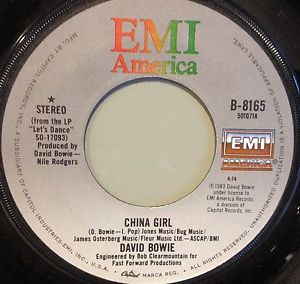
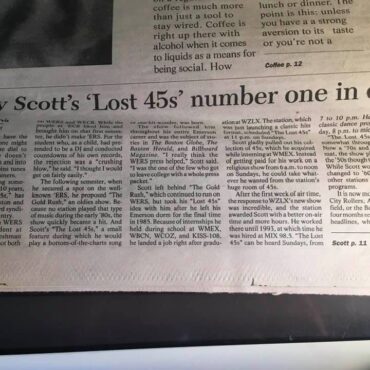
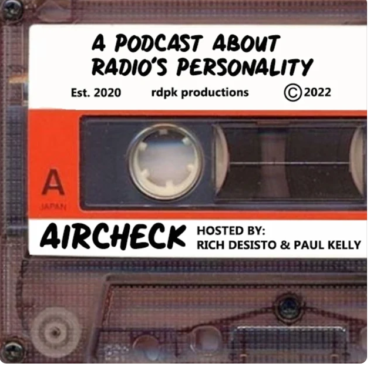
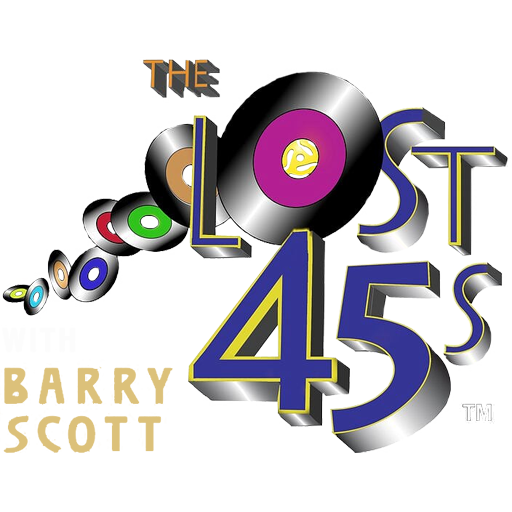
Post comments (0)